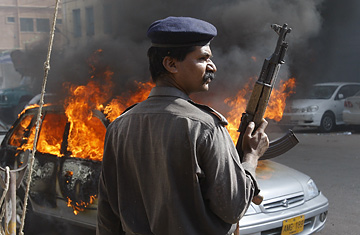
A policeman stands near a burning car during violence in Karachi, April 9, 2008.
There's no shortage of crises facing Pakistan's new leaders as their parliament convenes its first regular session on Thursday: an economic downturn, a crippling shortage of electricity, skyrocketing inflation — the price of bread has nearly doubled — and a rampant crime surge. Clashes between pro-government lawyers and supporters of President Pervez Musharraf in Karachi Wednesday left seven people dead. And moves to reinstate the independent judiciary sacked by Musharraf last November could bring new turmoil — Chief Justice Iftikhar Chaudhry could push for Musharraf's ouster on the grounds that his reelection was unconstitutional. And if he overturns the blanket amnesty granted to politicians charged with corruption, at least one key leader of the new ruling coalition, Benazir Bhutto's widower Asif Ali Zardari, could face renewed investigation.
But the biggest problem facing the new government is terrorism. There were more suicide and bomb attacks in Pakistan last year than in Afghanistan; and while there has been a lull since the March 15 bombing of a pizza restaurant in the capital, the respite is almost certain to be temporary.
The February election was widely viewed as a repudiation of President Pervez Musharraf, and the new government claims it as a mandate to reverse all of his policies — including his support for the U.S. war on terror. Upon taking office, Prime Minister Yusuf Raza Gilani announced to widespread approval that he would take a different approach, and suggested negotiations with the militants. "Musharraf sent 100,000 troops to the tribal areas, and more than 1,000 have died," says Tasneem Noorani, a former Interior Secretary who served under Musharraf in the early years of his rule. "And still we have problems. If that strategy were going to work it would have done so in four years. It's time to try a new approach."
Many Pakistanis blame the U.S.-led counterinsurgency campaign along the border with Afghanistan for the surge of attacks on civilian and military targets in Pakistan. Militants such as Tehrik-i-Taliban leader Baitullah Mehsud have encouraged this perception, justifying attacks on Pakistani forces by saying they were fighting America's war against Muslims. The overwhelming sense, even among mid-level bureaucrats and ministers, is that if the Americans leave the region, peace will prevail. "The problem," writes Irfan Husain, a columnist for Dawn newspaper, "is that many Pakistanis see the terrorists as fellow citizens with a legitimate cause. The fact is that the virulent anti-American sentiment that informs much of our political debate distorts our view of national self-interest. Far too many intelligent, educated Pakistanis feel that just because the Americans are against the Taliban and their supporters within Pakistan, we should take the opposite position."
While that nationalist rhetoric has prompted concerns in the U.S. that Washington is losing control of a vital element in the war on terror, military commanders in the region are more sanguine. Letting a newly democratic Pakistan, which enjoys the support of its citizens, take the lead may in fact work in America's favor, says one — if America is willing to be a little patient. "It's not like [the new Pakistani leaders] are going to stop fighting the war on terror, it's just that they will take longer," says a commander in the region whose job precludes him from speaking on the record. "Americans are really bad at taking the long view."
Still, talk of reconciliation recalls two failed peace accords in North and South Waziristan, in 2004 and 2006, that allowed militants to regroup and plan more attacks. U.S. officials estimate that attacks on NATO forces in Afghanistan went up 300% after the 2006 accord. The problem with those accords, says Ayaz Wazir, a former Pakistani ambassador and member of the Waziri tribe, was that they were signed by the government and the militants, leaving out tribal leaders who would have wielded more influence in the villages sheltering the militants. "They over looked the maliks [tribal chieftains], so the maliks washed their hands of the whole deal," says Wazir. "If you want to make it work, you have to include the tribal elders."
Analyst Farooq Khan is dubious that any kind of talks will bring progress. "Talking to militants is an exercise in futility. There is no meeting point between the demands of the militants and those of the state. The militants will demand that Pakistan must join hands to fight against America. They want free access to cross the border to fight alongside the Taliban. How can any state give these kind of concessions?"
But for the moment, talks may be Pakistan's only choice. The military solution has had limited effect, and in many cases has only exacerbated the problem. Pakistan's army, which was built to fight conventional wars with neighbors such as India, is ill equipped to handle an insurgency on its own turf. U.S. and British training is aiming to redress that problem, but that will take time. "It frustrates the hell out of them, but the only option in the short term is to do deals. Otherwise they will get their asses kicked," says a Western military source. "So you buy time until you can build up your capabilities. We mustn't get frustrated with them doing deals, because they have got no option."
By advocating talks, the government may also be getting the Pakistani public on board, says Khan. The government knows that the demands of the militants can't be met. "It's all political rhetoric," he says. "They will tell the people that they have tried everything, even talking to them. They will say, 'We tried, and we couldn't deliver, so we have to take some decisive actions.' And the public will be satisfied."
But even Khan can't help but be imbued by the hopeful spirit of a new approach. "Of course there is the remote chance that the militants will get frustrated and lose heart; they could give up and decide to stop fighting too."
